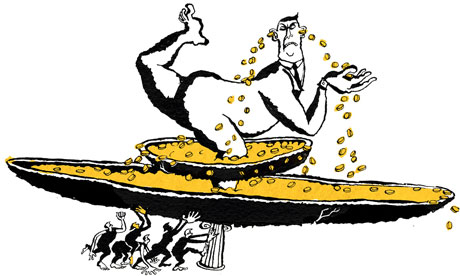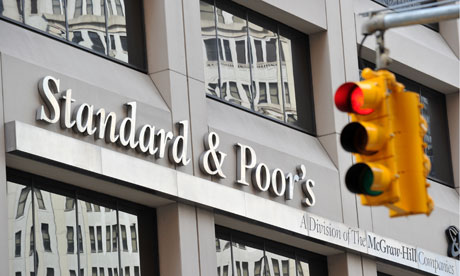Bargains are becoming a thing of the past as stores attract label hunters with deep pockets

A happy shopper with her Victoria Beckham charity-shop bargain. Photograph: Rex Features/London News Pictures
June Houghton, 83, from Rhyl in north Wales, pointed to a necklace in the window of an Oxfam shop in the Buckinghamshire town of Beaconsfield. "That's £150!" she said in disbelief. "I don't care if it's real gold, you don't sell that in a charity shop for £150! This may be a very affluent area, but there are pensioners and young people here too. I'm against charity shops now. I don't shop in them any more."
Her husband, Roy Turner, 86, agreed. "The prices here are double to three times those of any charity shop in north Wales."
In some cities and more affluent towns, scenes such as this are becoming increasingly common, as charity wardrobe chic pushes prices up and moves charity shops out of the reach of poorer people, a reversal of the original goal of creating a win-win situation. Traditionally, charity shops make money from stuff people don't want, the money goes to a good cause and buyers get a bargain for something they need – or value.
Sarah Raphael, deputy editor of i-D magazine, said: "The whole fun of charity-shop shopping is that it's a hunt; when you find that Yves Saint Laurent jacket from the 1970s beneath a jigsaw, it's that much more satisfying."
Now, however, the rules are changing – and the charity-shop industry, in parts, is beginning to look greedy. More than 10,000 charity shops now vie for business on our high streets. In the past six months their number has risen by more than 10%.
The shops, which have long enjoyed 80% mandatory relief on business rates, received a high-profile boost recently when a number of celebrities donated designer items. Donors on the A-list include Victoria and David Beckham, who gave boxes of their clothes and shoes to the British Red Cross in Chelsea, raising thousands of pounds for the charity. In spite of this, after earlier bumper profits, some charities are now experiencing a downturn.
Giants such as Oxfam have seen their profits plunge. In the past year, Oxfam's income fell by £17.6m. The charity, which has a network of nearly 700 shops, puts this down to the high street facing another year of economic downturn. But in spite of that, prices in shops in affluent areas can be surprisingly high.
Ian Matthews, Oxfam's head of retail, said: "The public kindly donates stock to Oxfam and we believe the best way to thank our donors is to get the best price we can, which in turn raises as much money as possible for Oxfam's work. All our shop managers have the flexibility to set their own prices, using their judgment and some guidance, to decide what prices and products will best suit customers in their location."
In the fashionable seaside town of Deal, Kent, there are now eight charity shops on the high street. Locals say they are packed, but people are not necessarily spending. Retired teacher Jane Neal, 63, said: "It used to be you could pick up amazing things, but now I think the people who work in the shops check on the computer and see an item's value immediately. The culture has changed."
Even in London, where vintage obsessives have long been prepared to rifle through the racks to find a fairly priced gem, customers complain that they are being priced out – and not just for designer labels. Modupe Tijani, 59, a carer from London, said she often sees clothing from Primark being sold at higher prices than it cost brand new. "It's not supposed to be like this," she said.
Mustafa Sami, 61, from London, who lost his job 18 months ago, agreed: "If you want a nice jacket, it costs a lot now."
One explanation for the rise in prices is that there is an increase in the number of dealers making excessive profits out of charity shops. One manager of a charity shop said: "We are trying to do what is best for everyone. We don't get it right every time, but we get it far more right than wrong. It has to be fair for the customer, for the donor and for the charity."






